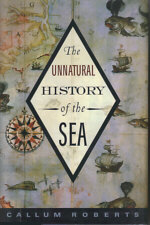  The Unnatural History
The Unnatural History
of the Sea
Callum Roberts
Island Press/Shearwater Books, 435 pp. $28.00
In his effort to put forth a case for conservation of remaining marine resources, author/scientist, Callum Roberts has written an epic thriller full of greed and violence and all the general craziness of which human beings are capable. He has also written a challenging mystery meticulously solved: a suspenseful page-turner leading the reader breathlessly to his final words-an eloquent description of a productive oceanic Eden which may still be possible.
Roberts, a marine conservation biologist in the Environmental Department of York University in England, describes the book merely "...from the dawn of commercial sea fishing in eleventh-century Europe to the present." Could this be the same book so extravagantly described above? Read on. I am not guilty of hyperbole.
In the first section of the book, "Explorers and Exploiters in the Age of Plenty," Roberts sets the stage for the ultimate degradation of the oceans of the world with the seemingly innocuous fact that somewhere in the mists of time, human beings ceased relying on fresh water fish and turned to their oceans for protein. Why? Because even in the mists of time we were tinkering with our environment. Deforestation, necessary for increased agricultural activity, caused run-offs which silted up and slowed the flow of streams and rivers. City populations became too large to be fed locally. Add mills and weirs and sewage in the course of human affairs and fish become noticeably scarce. Over fishing (sturgeon) was first legally addressed in 1289 in France.
First, waters along the European continent were intensely fished. As would become a pattern, fishers then ranged farther afield. Long before North America was colonized by Europeans, fish and fur bearing sea mammal stocks along both the east and west coasts were exploited by European fishers. Roberts relies extensively on diaries and observations of explorers, pirates and other sea-going humans to trace the depletion of specie after specie world wide. Whale populations shrank in the 11th and 12th century suggesting over fishing. Many varieties were fished to extinction by the early 18th century. (In the 1840s thousands of whales migrated along the California coast. In 1872, the count was forty.) Many fin fish are so long gone all we have left to know them by are their skeletons. As catches grew smaller and less profitable, fishers ranged ever farther.
In the second part of the book, Roberts addresses the crucial factor of the human ability to build better and better mousetraps. Rapidly improving technology in both gear and the power and size of fishing vessels scoured the oceans until, as Roberts puts it, [there was] "no place left to hide." The method of bottom trawling was invented before 1376 (but that is the first date of a written complaint about the method causing fish depletion) and the historical record is filled with such complaints right up to the present day. The next significant improvement to the beam trawl was in the late nineteenth century with the addition of steam to power the trawling vessels. By the mid twentieth century trawlers had penetrated the deep sea for the first time (suggesting that the breadth of the oceans no longer produced sufficient catch, therefore the depth needed to be plumbed).
Bottom trawling is the killer-app, literally. No creature, fish nor turtle nor sea fan nor coral nor sponge nor polyp escapes. In the early days of this highly "refined" technology, deep-water trawls took 15 to 30 tons of fish an hour. Seamounts and upwellings where an abundance of plankton occurred and fish gathered to spawn were targeted. As fisheries collapsed from over fishing and destruction of habitat, the factory ships roamed longer, farther and targeted less desirable fish until the next specie grew unprofitably scarce. By- catch fish have disappeared unnoticed.
And then there's "by kill" the hidden destruction of species and habitats never brought to the surface. "Fish, shellfish, corals and sponges get smashed, gashed and pulverized in situ by some of the most destructive fishing gear." Worse still is the lost gear, nets and lines by the mile, indestructible, left waving under the surface of the sea to "ghost fish" for eons.
Roberts argues that the indifference to the wholesale destruction of the marine resources is a case of shifting baselines. "Changes creep up on us, unnoticed by younger generations who have never known anything different. The young write off old people who rue the losses they have witnessed as either backward or dewy-eyed romantics. But what about the losses that none alive today have seen? In most parts of the world, human impacts on the sea extend back for hundreds of years, sometimes more than a thousand...The greater part of the decline of many exploited populations happened before the birth of anyone living today."
For 432 pages, Roberts eloquently accomplished "an account of the history of fishing and the effects it has had on the sea." In just the last thirty-four pages of the book, he brings us into the sunshine of hope. His solution is absolute. We must completely reinvent "fisheries management." He then proceeds to offer seven straightforward commonsense reforms.
Five years in the researching and writing, the book presents a comprehensive exploration of its subject but it is Roberts' writing, clear-eyed, elegantly reasoned yet literally thrumming with controlled passion that keeps the reader, riveted with a racing heart, through all the centuries of carnage and tragic beauty to a quiet conviction that we can reverse the almost inevitable.

FMI: www.york.ac.uk/res/unnatural-history-of-the-sea
And Marine Stewardship Council www.msc.org
And Sustainable Seafood Choices www.seafoodchoices.com
|